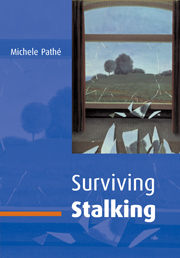Book contents
- Frontmatter
- Contents
- Acknowledgments
- Introduction
- 1 What is stalking?
- 2 How common is stalking?
- 3 Who stalks?
- 4 Could I be assaulted?
- 5 Can stalkers be treated?
- 6 Who are the victims of stalking?
- 7 The impact of stalking
- 8 Reducing your chances of victimization
- 9 Evading the stalker
- 10 Navigating the criminal justice system in the United States of America
- 11 Navigating the criminal justice system in the United Kingdom
- 12 Navigating the criminal justice system in Australia
- 13 Should I just disappear?
- 14 How do I deal with the emotional impact of stalking?
- 15 How you can assist victims of stalking
- Conclusions
- References
- Reading guide
- Appendix 1 Other resources
- Appendix 2 Protection from Harassment Act 1997
- Appendix 3 Sample restraining order under Protection from Harassment Act 1997
- Appendix 4 Criminal justice system flow chart, UK
- Index
3 - Who stalks?
Published online by Cambridge University Press: 04 September 2009
- Frontmatter
- Contents
- Acknowledgments
- Introduction
- 1 What is stalking?
- 2 How common is stalking?
- 3 Who stalks?
- 4 Could I be assaulted?
- 5 Can stalkers be treated?
- 6 Who are the victims of stalking?
- 7 The impact of stalking
- 8 Reducing your chances of victimization
- 9 Evading the stalker
- 10 Navigating the criminal justice system in the United States of America
- 11 Navigating the criminal justice system in the United Kingdom
- 12 Navigating the criminal justice system in Australia
- 13 Should I just disappear?
- 14 How do I deal with the emotional impact of stalking?
- 15 How you can assist victims of stalking
- Conclusions
- References
- Reading guide
- Appendix 1 Other resources
- Appendix 2 Protection from Harassment Act 1997
- Appendix 3 Sample restraining order under Protection from Harassment Act 1997
- Appendix 4 Criminal justice system flow chart, UK
- Index
Summary
Stalking is not the exclusive domain of either gender, but in most studies to date around 80% of stalkers have been male. People of any age from teenagers to octogenarians can stalk, but those in their thirties most commonly engage in the behaviour. Many stalkers are unemployed, some as a direct result of their all-consuming pursuit of their victim, but a significant minority are professionally employed or hold other responsible positions. Over half of all stalkers studied have never experienced a long term relationship, and a third are separated or divorced.
Stalking, like any form of complex human behaviour, can be the product of a number of different states of mind. An Australian study of 145 stalkers (Mullen et al., 1999) found that while the majority were drawn from society's lonely, isolated and disadvantaged, individuals from the entire social spectrum were represented. The study also revealed that, though undoubtedly disturbed, most did not have any diagnosable major mental illness. The stalkers in the study by Mullen and colleagues could be grouped into five categories, largely on the basis of the stalker's principal motivation and the context in which the stalking arose. These categories are described below. Their management is discussed in Chapter 5.
The rejected
This is thought to be the largest group of stalkers, comprised predominantly, but not exclusively, of ex-partners. It is therefore not surprising that there is some overlap between the characteristics of this category of stalking and those of domestic violence.
- Type
- Chapter
- Information
- Surviving Stalking , pp. 19 - 30Publisher: Cambridge University PressPrint publication year: 2002



